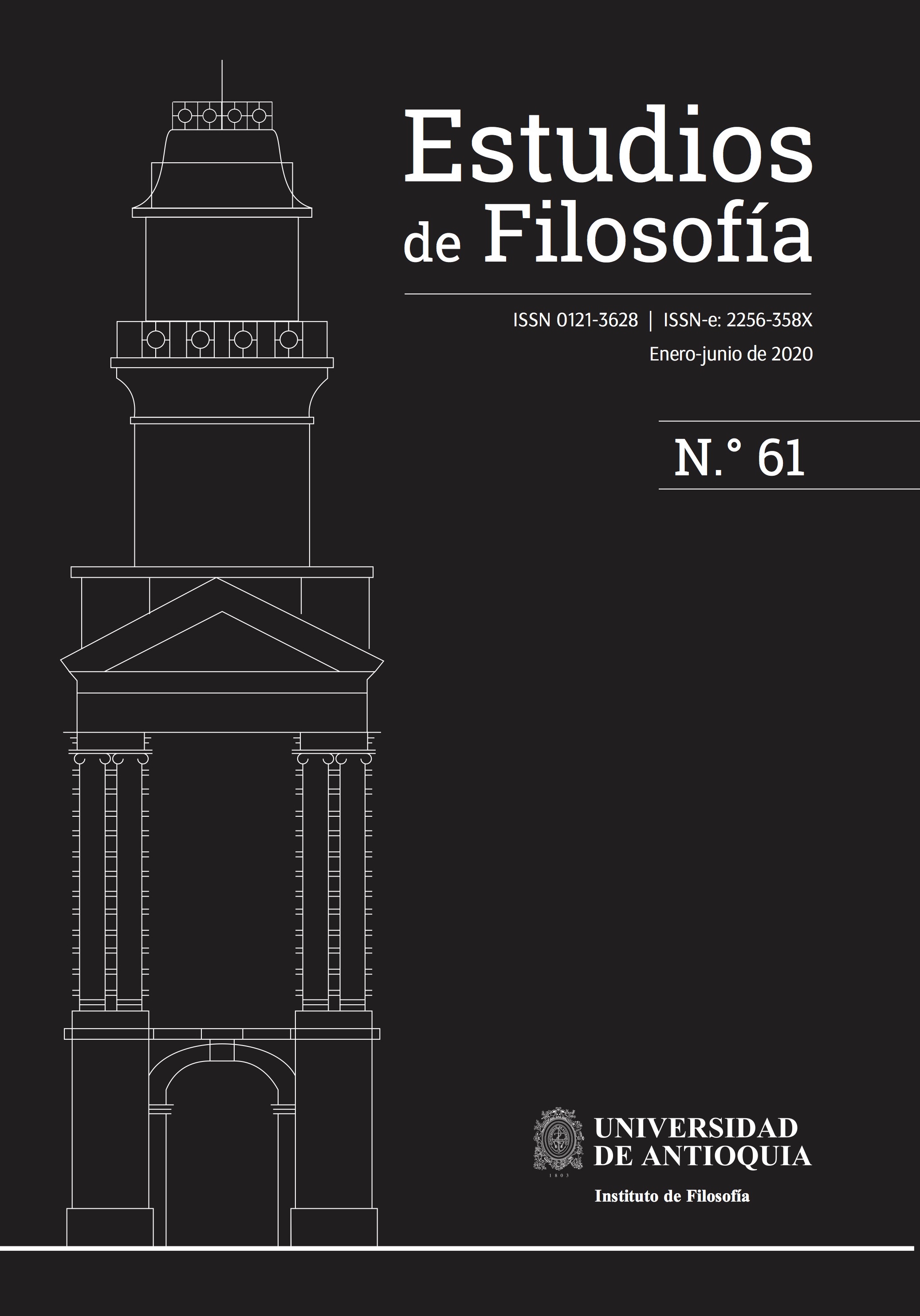Heidegger and the reminiscent thinking
DOI:
https://doi.org/10.17533/udea.ef.n61a08Keywords:
Heidegger, thinking, forgetting, rememberin, temporalityAbstract
Within the variety of subjects considered by Heidegger after Being and time, the notion of ‘thinking’ stands out for its constant presence and for the central place it occupies in a large part of his later work. In fact, as a path towards overcoming metaphysics and as a means of rethinking the relationship between humans and being, distorted in the world of technique, Heidegger uses the exercise of thinking that is not only the heritage of philosophers, but is latent in many of the habitual practices of individuals. This article aims to elaborate this notion in line with the concepts of forgetting and remembering, which are both human experiences and constitutive elements of being in its happening. The outlined thesis is thus that, in a world dominated by the entity, Heidegger ascribes to the ‘reminiscent thinking’ the task of restoring our relationship with being and thus widening the possibilities of meaning of our existence.
Downloads
References
Hegel, G. W. F. (1986). Phänomenologie des Geistes. Frankfurt am Main: Suhrkamp.
Heidegger, M. (1954). Was heist Denken? Tübingen: Max Niemeyer.
Heidegger, M. (1967). Aletheia. Vorträge und Aufsätze, Teil III. Pfullingen: Neske.
Heidegger, M. (1967a). Sein und Zeit. Tübingen: Max Niemeyer.
Heidegger, M. (1976). Gesamtausgabe, Band 9: Wegmarken. En F.-W. von Hermann (Ed.). Frankfurt am Main: Klostermann.
Heidegger, M. (1982). Gesamtausgabe, Band 52: Hölderlins Hymne “Andenken”. En C. Ochwadt (Ed.). Frankfurt am Main: Klostermann.
Heidegger, M. (1991). Gesamtausgabe, Band 3: Kant und das Problem der Metaphysik. En F.-W. von Hermann (Ed.). Frankfurt am Main: Klostermann.
Heidegger, M. (2000). Tiempo y ser. Madrid: Tecnos.
Heidegger, M. (2001). De la esencia de la verdad. Hitos. Madrid: Alianza.
Heidegger, M. (2001a). Carta sobre el humanismo. Hitos. Madrid: Alianza.
Heidegger, M. (2003). Gesamtausgabe, Band 46: Zur Auslegung von Nietzsches II. Unzeitgemässer Betrachtung. En H.-J. Friedrich (Ed.). Frankfurt am Main: Klostermann.
Heidegger, M. (2007). Gesamtausgabe, Band 14: Zur Sache des Denkens. En F.-W. von Hermann (Ed.). Frankfurt am Main: Klostermann.
Risser, J. (1997). Hermeneutics and the Voice of the Other. Albany: SUNY Press.
Nietzsche, F. (1999). Vom Nutzen und Nachteil der Historie für das Leben (Unzeitgemässige Betrachtungen II). G. Colli & M. Montinari (Eds.), Kritische Studienausgabe, KSA 1. Berlin: Walter de Gruyter.
Romano, C. (1999). L’événement et le temps. Paris: PUF.
Schürmann, R. (2013). Le principe d’anarchie. Heidegger et la question de l’agir. Paris: Diaphanes.
Published
How to Cite
Issue
Section
Categories
License
Copyright (c) 2020 Luis Eduardo Gama Barbosa

This work is licensed under a Creative Commons Attribution-NonCommercial-ShareAlike 4.0 International License.
Authors who publish with this journal agree to the following terms:
1. The Author retains copyright in the Work, where the term "Work" shall include all digital objects that may result in subsequent electronic publication or distribution.
2. Upon acceptance of the Work, the author shall grant to the Publisher the right of first publication of the Work.
3. The Author shall grant to the Publisher a nonexclusive perpetual right and license to publish, archive, and make accessible the Work in whole or in part in all forms of media now or hereafter known under a Creative Commons Attribution-NoCommercia-ShareAlike (CC BY-NC-SA 4.0), or its equivalent, which, for the avoidance of doubt, allows others to copy, distribute, and transmit the Work under the following conditions: (a) Attribution: Other users must attribute the Work in the manner specified by the author as indicated on the journal Web site;(b) Noncommercial: Other users (including Publisher) may not use this Work for commercial purposes;
4. The Author is able to enter into separate, additional contractual arrangements for the nonexclusive distribution of the journal's published version of the Work (e.g., post it to an institutional repository or publish it in a book), as long as there is provided in the document an acknowledgement of its initial publication in this journal;
5. Authors are permitted, and Estudios de Filosofía promotes, to post online the preprint manuscript of the Work in institutional repositories or on their Websites prior to and during the submission process, as it can lead to productive exchanges, as well as earlier and greater citation of published work (see The Effect of Open Access). Any such posting made before acceptance and publication of the Work is expected be updated upon publication to include a reference to the Estudios de Filosofía's assigned URL to the Article and its final published version in Estudios de Filosofía.
















